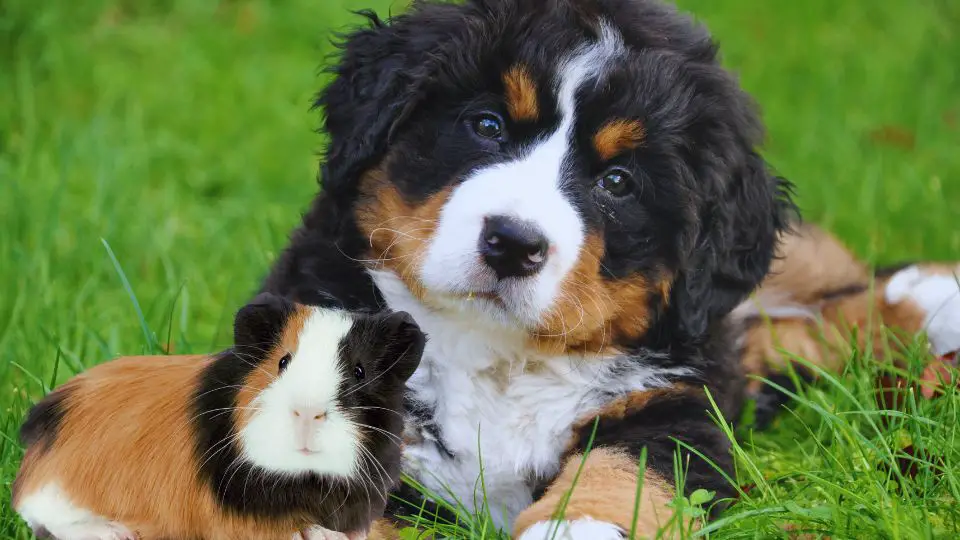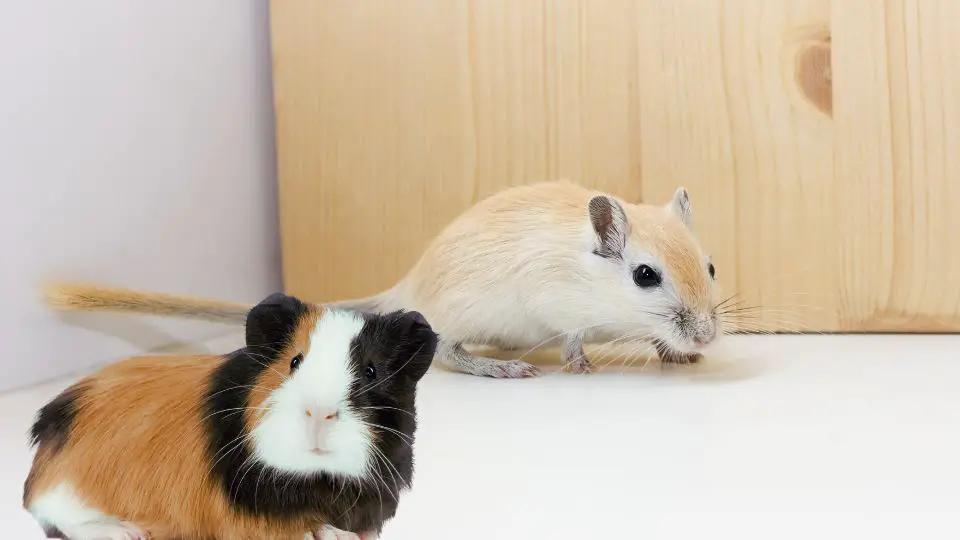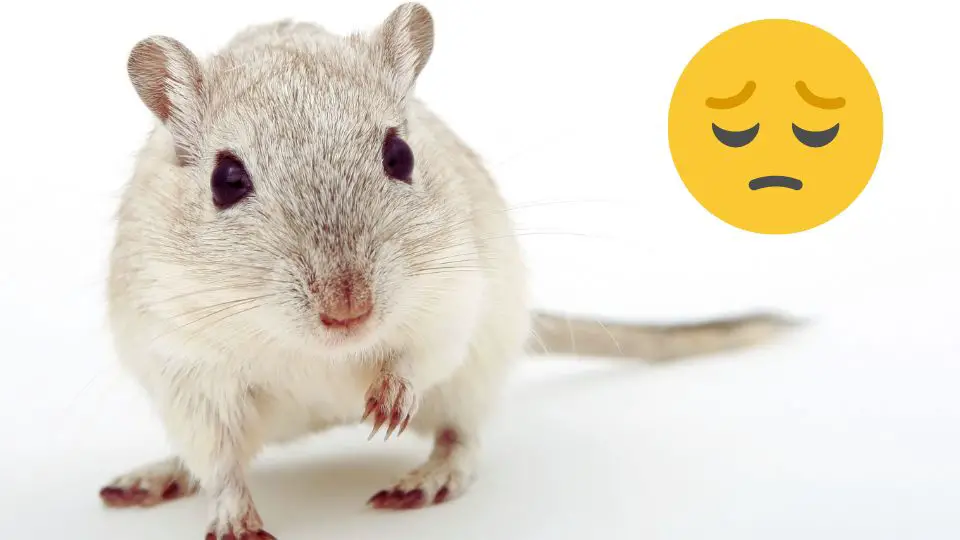When a gerbil is in critical condition or showing signs of decline, it can be a distressing and urgent situation for gerbil owners.
When attempting to save a dying gerbil, it is crucial to act quickly and seek immediate veterinary help. Professional care and guidance are essential in determining the best course of action to increase the gerbil’s chances of survival.
This article provides guidance and steps to take when faced with a dying gerbil, with the aim of providing immediate care and support to increase their chances of survival.
Recognizing Signs of a Dying Gerbil
When a gerbil is in a critical condition, there are several physical symptoms that may become apparent. These signs serve as indicators that immediate veterinary attention is necessary. Some of the physical symptoms to look out for include:
- Rapid weight loss or emaciation: Sudden and significant weight loss may indicate a serious underlying health issue.
- Difficulty breathing or rapid, shallow breathing: Labored breathing, wheezing, or gasping for breath are signs of respiratory distress.
- Lethargy and lack of response to stimuli: A gerbil that appears excessively tired, weak, or unresponsive may be nearing the end of its life.
- Abnormal posture or inability to move properly: If a gerbil is struggling to maintain balance, shows signs of paralysis, or experiences difficulty moving, it may be a critical condition.
- Pale or discolored gums and mucous membranes: Pale or bluish gums can be a sign of inadequate oxygenation or circulation.
- Seizures or convulsions: Uncontrolled muscle contractions, twitching, or shaking may indicate a serious underlying health issue.
Behavioral Changes and Decline in Activity
In addition to physical symptoms, a dying gerbil may exhibit behavioral changes and a decline in activity. These changes are often indicative of their declining health and impending passing. Some of the behavioral signs to watch for include:
- Loss of appetite or refusal to eat: A gerbil that stops eating or shows a significant decrease in appetite may be nearing the end of its life.
- Decreased interest in social interaction: If a gerbil becomes withdrawn, shows less interest in interacting with humans or cage mates, and spends more time alone, it may be a sign of their declining condition.
- Withdrawal and hiding in secluded areas: Dying gerbils often seek solitude and may spend more time in hiding places or secluded areas of their enclosure.
- Unresponsiveness to familiar sounds or voices: A gerbil that no longer reacts to familiar sounds or voices may be experiencing a decline in their senses or energy levels.
- Inability to groom themselves properly: A gerbil that stops grooming itself or appears unkempt may be too weak or ill to perform normal grooming behaviors.
- Vocalization changes, such as unusual sounds or silence: Dying gerbils may exhibit changes in their vocalizations, such as unusual sounds or complete silence.
Note that these signs may vary depending on the individual gerbil and their specific health condition. If you observe any of these symptoms in your gerbil, it is crucial to seek immediate veterinary attention for a proper diagnosis and guidance on how to provide the best care and support during this difficult time.
Emergency Care for a Dying Gerbil
When a gerbil is in critical condition and nearing the end of its life, providing emergency care becomes crucial to ensure their comfort and well-being. As a gerbil owner, it is essential to be prepared to offer immediate support during this difficult time.
Here are the steps we recommend you to take to provide emergency care for a dying gerbil.
Ensure a Quiet and Comfortable Environment
Creating a quiet and peaceful environment is paramount when providing emergency care for a dying gerbil. Minimizing noise and disturbances can help reduce stress and promote a sense of calm. Place the gerbil’s enclosure in a quiet area of your home, away from loud noises, bright lights, and excessive foot traffic.
Maintain Optimal Temperature and Humidity
Maintaining an optimal temperature and humidity level is important for the well-being of a gerbil, especially when they are in critical condition. Gerbils are sensitive to temperature extremes, so ensure the environment remains within a suitable range. The ideal temperature for gerbils is typically between 65-75°F (18-24°C). Additionally, ensure the humidity is at a comfortable level, typically around 40-60%.
Provide Access to Food and Water
While a dying gerbil may have a decreased appetite, it is essential to provide access to food and water in case they exhibit any interest or need sustenance. Place fresh food and water within easy reach, ensuring it is easily accessible for the gerbil. Consider providing soft or easily consumable foods, such as wetted pellets or fresh fruits and vegetables, to make eating more manageable for them.
Remember that not all gerbils may show an interest in food or water during their final moments. They may be too weak or unable to consume anything. In such cases, it is best to consult with a veterinarian who can guide you on providing comfort measures and palliative care for your gerbil.
Maintaining Hydration and Nutrition
Hydration is crucial for the well-being of a gerbil, even in their final moments. Encourage the gerbil to drink water by offering a small, shallow dish filled with fresh water within easy reach. Ensure the water is changed regularly to keep it clean and fresh. You can also try using a water bottle with a small spout that the gerbil can easily access. Gently guide their nose towards the water source to encourage drinking.
Offer Soft, Easily Digestible Foods
In some cases, a gerbil may have a decreased appetite or difficulty eating due to their condition. If recommended by the veterinarian, offer soft, easily digestible foods to provide some nutrition.
Wetting their regular gerbil pellets with a small amount of water or providing mashed fruits and vegetables can make it easier for them to consume and digest.
As we said, not all gerbils in critical condition may show an interest in drinking water or eating. They may be too weak or unable to consume anything. In such cases, it is best to consult with a veterinarian experienced in small animal care who can guide you on providing comfort measures and palliative care for your gerbil.
Seeking Veterinary Help
We recommend consulting a veterinarian experienced in small animal care is crucial when dealing with a dying gerbil. These professionals have the knowledge and expertise to assess the gerbil’s condition, provide appropriate guidance, and offer compassionate care tailored to the specific needs of small animals like gerbils.
They can help determine the best course of action based on the gerbil’s symptoms, provide pain management options, and offer advice on how to make the gerbil as comfortable as possible during their final moments.
In some cases, the gerbil’s condition may deteriorate rapidly, requiring immediate attention. If you notice severe distress, difficulty breathing, severe pain, or any other critical symptoms, it is important to promptly contact an emergency veterinary clinic.
These clinics have staff available around the clock to address emergency situations and provide urgent care. They can guide you on what steps to take before bringing the gerbil to the clinic and ensure that appropriate measures are taken to alleviate their suffering.
Supporting the Gerbil’s Comfort
If your gerbil is under veterinary care, the veterinarian may prescribe medications or treatments to alleviate pain or manage symptoms. It’s essential to follow the veterinarian’s instructions carefully and administer any prescribed medications as directed. These treatments can help improve the gerbil’s comfort and overall well-being during their final days.
Offering Gentle Reassurance and Comfort
During this sensitive time, it’s important to provide your gerbil with gentle reassurance and comfort. Spend time near their enclosure, speaking softly and offering a calming presence. Avoid sudden loud noises or disruptions that could cause additional stress. Providing a quiet and peaceful environment can help reduce anxiety and promote a sense of security for your gerbil.
Making Difficult Decisions
As a gerbil owner, it can be incredibly challenging to make difficult decisions regarding your gerbil’s end-of-life care. It’s crucial to consider the gerbil’s quality of life and any signs of suffering they may be experiencing. Assess their ability to eat, drink, move, and engage in normal behaviors. Consult with your veterinarian about the gerbil’s condition and discuss the possibility of euthanasia if their suffering cannot be alleviated.
Euthanasia is a compassionate option to consider when a gerbil’s suffering cannot be effectively managed, and their quality of life is significantly compromised. Your veterinarian can provide guidance and support during this difficult decision-making process. They will help you understand the procedure, its implications, and ensure that it is carried out with care and compassion.
Conclusion
In conclusion, when faced with a dying gerbil, swift action and appropriate care are crucial. Recognizing the signs of a critical condition, providing immediate first aid, and seeking veterinary help are essential steps in attempting to save a gerbil’s life. While not all cases may have a positive outcome, it’s important to make every effort to provide comfort, hydration, and necessary treatment during this critical time.
Remember to consult with a veterinarian, who can provide professional guidance and support tailored to your gerbil’s specific needs. Through your dedication and proactive response, you can give your gerbil the best possible chance of survival and ensure that they receive the care and attention they need in their time of need.







